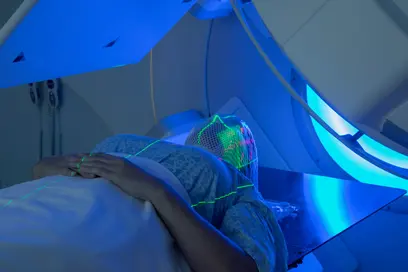Bowel (colorectal) cancer develops slowly. Precancerous stages often take many years to develop into a dangerous carcinoma. They are well detectable by colonoscopy and can even be removed during the same examination. Therefore, possibilities of preventing colorectal cancer by consistent early detection measures are much better than for other types of cancer. Screening colonoscopy has been part of the statutory early cancer detection program in Germany since 2002; a test for occult blood in the stool has even been offered by statutory health insurances since 1977.
“If more people participated in such screening examinations, a considerable number of colorectal cancer cases could be prevented each year in Germany," says Professor Dr. Hermann Brenner of the German Cancer Research Center. With the aim of increasing compliance rates with screening programs, the DKFZ epidemiologist will shortly launch a model project in collaboration with Saarland Cancer Register. While previous early detection programs have relied solely on people’s own initiative to take part in screening, this research project will test an approach called organized screening. The register is used for randomly selecting citizens who will be sent a personal invitation by mail to one of the two screening examinations. Approximately 30,000 persons living in the State of Saarland born 1962 to 1957 will receive such an invitation letter.
The project is intended to answer various questions: To what extent can participation rates in both procedures be increased? Do repeated invitations lead to further increases? Is it useful to include test materials for the stool examination in the letters? How often is a positive test for blood in the stool followed by a colonoscopy examination?
“Of course, we also need to determine the cost-effectiveness of invitation-based screening, that is to compare the costs to the expected long-term decrease in the number of colorectal cancer cases. It is therefore important to develop a possibly simple organizational approach," said Hermann Brenner. “If the project is successful – and that’s what we expect –, it could serve as a model for introducing invitation-based bowel cancer screening throughout Germany." Following the success of invitation-based screening programs in other countries, Germany relied on this concept from the very start when introducing mammography screening for early breast cancer detection by inviting women by mail to participate.
The project will be funded as part of the National Cancer Plan by the German Health Ministry for a period of three years.
The Cancer Information Service (Krebsinformationsdienst, KID) of the German Cancer Research Center answers questions about cancer from patients, their families and interested members of the public. The telephone service is available daily from 8 a.m. to 8 p.m. at the toll-free number 0800-420 30 40 or can be reached via e-mail at krebsinformationsdienst@dkfz.de. On its website, at www.krebsinformationsdienst.de, the service additionally provides plenty of information on the topic of cancer.
Throughout March’s Bowel Cancer Awareness Month, an additional line on early bowel cancer detection will be available at the same toll-free number on workdays from 9 a.m. to 7 p.m. On this line, staff members of the Cancer Information Service will provide information about the various possibilities of prevention and early detection of bowel (colorectal) cancer as well as about the disease and treatment possibilities.
Cancer information has one number: 0800 420 30 40 (daily from 8 a.m. to 8 p.m.)
Cancer information via e-mail: krebsinformationsdienst(at)dkfz.de
Cancer information on the Internet: www.krebsinformationsdienst.de



